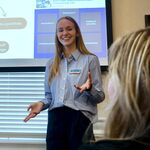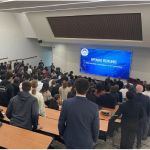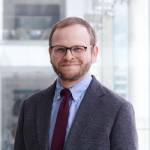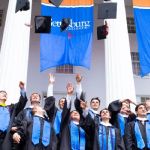
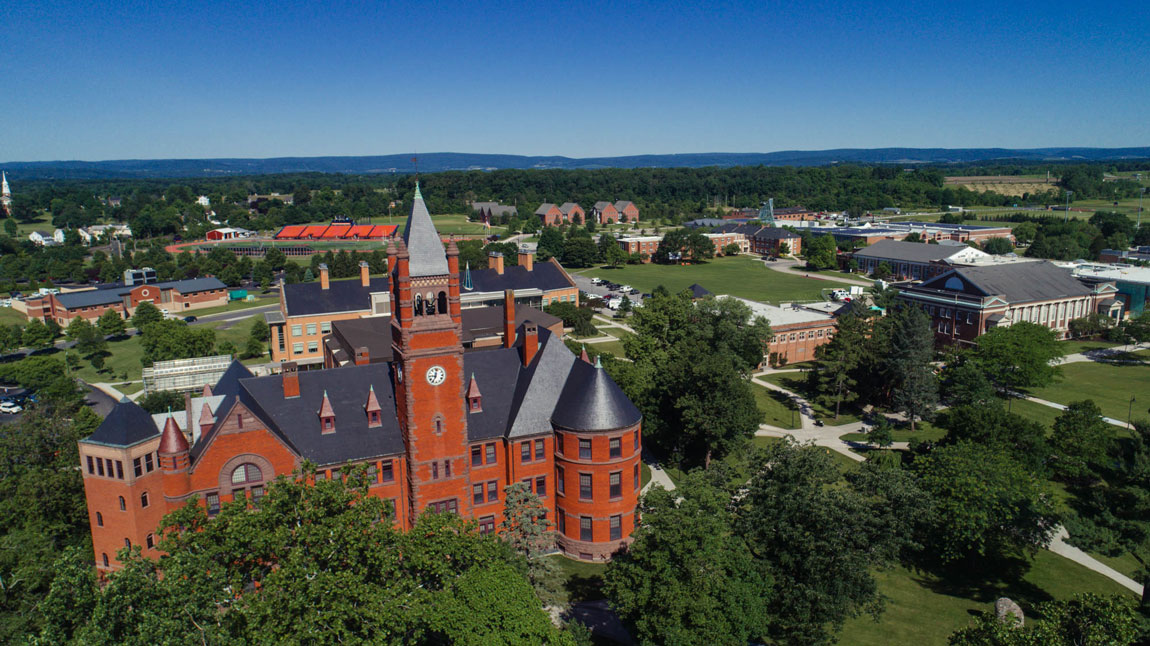
Earning tenure is a major milestone, and eight Gettysburg College professors achieved that milestone this year. We're proud of our professors for their dedication to our students and their passion for education.
Read below to learn more about the achievements of our newly tenured professors.
Interdisciplinary Studies Prof. Abdulkareem Said Ramadan
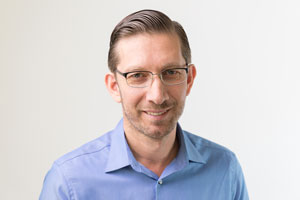
Prof. Abdulkareem Said Ramadan earned his PhD in Arabic and Applied Linguistics at the University of Damascus where he also earned an MA in Arabic Syntax and Morphology. His research interests include Arabic syntax and morphology, applied linguistics, sociolinguistics, and foreign language education.
Said Ramadan’s course objectives aim to reinforce the College’s commitment to internationalization and creating greater global awareness for students. “One of my fundamental goals as a teacher is to inspire my students to make interdisciplinary connections and to develop the ability to think critically from diverse perspectives,” he said. “I believe that the integration of knowledge and the capacity to make connections across disciplines are at the core of the liberal arts education.”
Since coming to Gettysburg in 2011, Ramadan has enjoyed the opportunity to combine his research interests with teaching Arabic language and culture. “My work at Gettysburg College has been invaluable in developing and experimenting with new Arabic language pedagogy, which I made use of in my courses, and in providing a foundation for my research in second language learning and Arabic grammar,” he said.
Environmental Studies Prof. Andrew Wilson
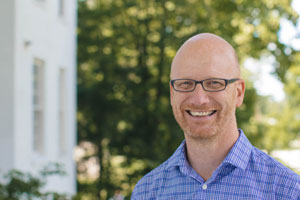
Prof. Andrew Wilson first taught at Gettysburg College as an adjunct professor in Environmental Studies. Shortly after, he earned a full-time faculty position in the department. Most of his research over the years has focused on birds, and in particular, how environmental change impacts bird populations and distributions. In addition, he has worked extensively with large-scale Citizen Science projects and developed expertise in analyzing large data sets, usually with a spatial component.
In the classroom, Wilson seeks to engage his students in the study of natural history and teaches them the basics of field biology and species identification. In doing so, he ignites a passion and enthusiasm for wildlife in many of his students. “There are plenty of jobs out there that require field biology skills,” he said. “A love and understanding of wildlife provides wonderful opportunities for lifelong learning and improving our mental health.”
Psychology Prof. Christopher Barlett
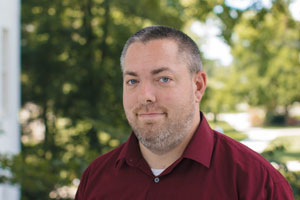
When he was seven years old, Prof. Christopher Barlett knew he wanted to be a professor like his dad. “My dad was (and still is) my hero, so I was naturally inclined to want to do what he did,” Barlett said. “Watching him teach inspired me, and I knew that I was going to get my PhD.”
He earned his PhD in social psychology from Iowa State University in 2012. Barlett is an experimental social psychologist who studies the variables and psychological processes involved in aggression. He uses experimental, correlational, meta-analytic, and longitudinal methods to answer theoretical questions regarding aggression. “The balance between teaching and research is important,” he said. “Gettysburg College expects research to be done at a high caliber level, and teaching 2 to 3 classes per semester makes that possible.”
When teaching in the classroom, Barlett focuses on getting his students to understand the complexity of research design. “I am a big proponent of theory and teaching how various research designs can be used to build, test, and (dis)confirm,” he said. “I strive to get students to learn the details of research studies while emphasizing how such details are used to build theory.”
Philosophy Prof. Gary Mullen
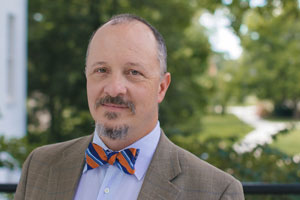 Prof. Gary Mullen’s research focuses on developments in social and political philosophy after World War II and the specific challenges posed to democracy by developments in media technology and its potential to distort public opinion and political judgment. His current research on the work of Theodor W. Adorno addresses the need to revise our most basic assumptions about freedom, rational agency, and national sovereignty in the face of genocide.
Prof. Gary Mullen’s research focuses on developments in social and political philosophy after World War II and the specific challenges posed to democracy by developments in media technology and its potential to distort public opinion and political judgment. His current research on the work of Theodor W. Adorno addresses the need to revise our most basic assumptions about freedom, rational agency, and national sovereignty in the face of genocide.
Mullen’s students benefit from his expertise in political philosophy, and he brings his research and experiences into the classroom. “I’m amazed at the level of interaction I get with my students, and the energy they bring to the classroom,” Mullen said. “They’re interested in how philosophy effects everyday life, and they recognize that inquiry should never stop.”
Africana Studies Prof. Hakim Williams
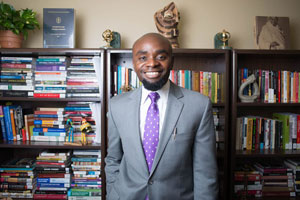
Prof. Hakim Mohandas Amani Williams is an Associate Professor of Africana Studies, Director of Peace and Justice Studies, and a faculty affiliate in Education, Globalization Studies, and Public Policy. He completed his BA in Psychology at St. Francis College, Brooklyn; a Master of Education in Comparative and International Education with a concentration in philosophy of education; and a Master of Arts and Doctor of Education in International Educational Development, with a concentration in peace education, at Teachers College, Columbia University.
After studying school violence and bullying, Williams’s interest expanded to include the structural violence of educational inequity. He also works on student, teacher, and community empowerment, and has been conducting a nine-year longitudinal study in Trinidad and Tobago. “My research feeds directly into all of the classes I teach, and I am able to give my students a very present-day sense of contemporary life in the Caribbean.”
Williams said he believes that this life demands a particular kind of global citizen and sets out to help prepare his students for that kind critical citizenship. “In the moment, many of my students complain, but many come back later on and thank me for raising the bar in the classroom,” Williams said. “After they graduate, I want them to be able to wrangle with the best anywhere in the world.”
Psychology Prof. Kathy Berenson
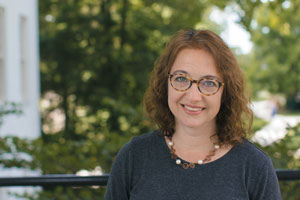
After conducting clinical and personality psychology research at large universities, Prof. Kathy Berenson came to Gettysburg College because she craved a closer working relationship with her students. “At Gettysburg College, students have opportunities to work closely with faculty, in ways you don’t see most places,” she said. “The depth and breadth of experience that students in my department get as research assistants and independent researchers—in our advanced lab classes, working in our labs, and during intensive summer research fellowships—is really quite remarkable.”
Berenson’s research is on the processes by which social-cultural risk factors are associated with mental health problems. She’s also interested in the experiences of people living with mental illness, including stigma, identity concerns, and relationship strain. Most recently, Berenson has been studying the ways in which popular trends in our culture, such as overvaluing self-confidence, may be interfering with compassion for ourselves and others.
Over the years, Berenson has taught her students about the mental health field, and helped them understand its hidden complexities hidden in the field. “Many students have the desire to help people with mental health problems, but this is a topic so strongly linked with conflicting emotions and popular misconceptions that it can be hard for them to know where to begin,” she said. “I think my work with students, both in and out of the classroom, helps them accept that the mental health field has no easy answers, and that the complex scientific and personal challenges it presents can nevertheless be very rewarding to take on.”
English Prof. McKinley E. Melton
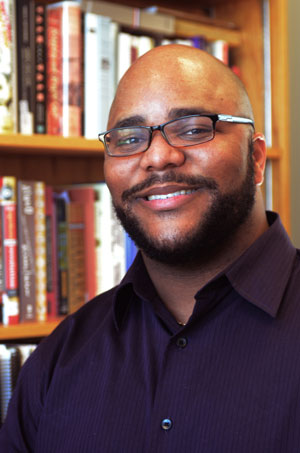
As a sophomore at Duke University, Prof. McKinley Melton was invited to an informational dinner for the Mellon Mays Undergraduate Fellowship program, which was a program designed to help diversify the professoriate by encouraging and supporting underrepresented students in their pursuit of PhDs. It was at this dinner that Melton decided he was going to get his PhD.
Prior to joining the Gettysburg College faculty, Melton was a visiting assistant professor of literature at Hampshire College from 2007-2012. He primarily works in 20th and 21st Century African American Literature, but situates his work within the broader African Diaspora by looking at West African and Afro-Caribbean literary traditions. He explores multiple genres, with a primary emphasis on novels and poetry, but is also interested in ways that religious and spiritual traditions inform creative expression for Africana peoples and cultures. He’s written mostly on prolific author James Baldwin but also published essays on Zora Neale Hurston, Richard Wright, Martin Luther King, Jr., and Danez Smith, among others.
Melton was drawn to Gettysburg College because of its commitment to the tradition of the liberal arts. “The idea of an integrative educational experience, where students are encouraged to place concepts from classrooms across campus in conversation with one another, is pretty powerful,” Melton said. “Moreover, Gettysburg is very intentional in offering the support and resources to help students be successful in their academic pursuits.”
Biology Prof. Ryan Kerney
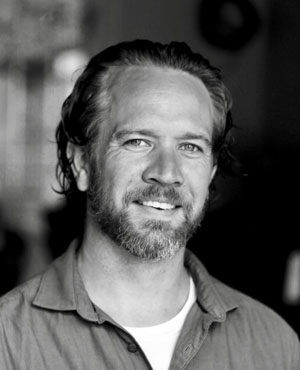
As an organismal biologist, Prof. Ryan Kerney studies amphibian embryos and larvae. His particular research questions have focused on the formation and metamorphosis of the skeleton, the evolution of amphibian life histories, and interactions between embryos and microbes. “Since arriving at the College I have raised over $1.4 million in outside support for my research with students and collaborators,” he said. “However, a large amount of my work focuses on updating and revising our introductory biology offerings in order to make them more inclusive and inquiry-based.”
The primary courses that Kerney teaches are in introductory biology, but on alternating years he offers either a seminar on microbial symbioses or a developmental biology course. “The course on microbial interactions is a terrific way to expose students to some of the microbial interactions that I and many others study,” he said. “Developmental biology spans cloning, stem cells, assisted reproduction, and a huge range of advances in our understanding of gene function and morphogenesis using model organisms.”
Having arrived at the college in 2012 after working on environmental policy at the Department of Energy, Kerney has spent the last six years teaching and doing research, but his experiences in the classroom helped to create an environment that he could be proud of. “I’ve been incredibly fortunate to work with some terrific students in my lab and classes,” Kerney said. “It has been amazing to watch them cultivate their interests and directions in both lab and life.”
Eight faculty members earn tenure
Posted: 09/17/18
